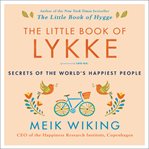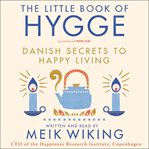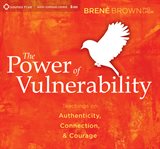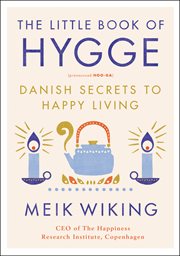The little book of lykke Secrets of the world's happiest people
eAudio - 2017
Join the happiness revolution! The author of the New York Times bestseller The Little Book of Hyggeoffers more inspiration and suggestions for achieving greater happiness, by practicing Lykke (LOO-ka)-pursuing and finding the good that exists in the world around us every day. While the Danes are the happiest people on the planet, happiness isn't exclusively Danish; cultures around the world have their own unique approaches to leading a contented, fulfilled life. For his work at the Happiness Research Institute in Copenhagen, Meik Wiking travels the globe from Dubai to Finland, Rio de Janeiro to Bhutan, South Korea to the United States, to discover the secrets of the very happiest people. In The Little Book of Lykke, Meik identifies the... six factors that explain the majority of differences in happiness across the world-togetherness, money, health, freedom, trust, and kindness-and explores what actions we can take to become happier. As he reveals, we can deepen our blissfulness and contentment with little adjustments in our behavior, whether it's eating like the French (sitting around a table and savoring our time) or dancing the tango like Argentinians in Buenos Aires. With his trademark warmth and wit, Meik explores the happiness gap for parents, how much money you really need to buy happiness, how we can be healthier without having to go to the gym, how we can learn to build trust and collaboration, how we can help ourselves by helping others, and why our expectations often outweigh our reality. Weaving together original research and personal anecdotes, The Little Book of Lykke is a global roadmap for joy that offers a new approach to achieving everyday happiness that not only improve our own lives, but help us build better communities and a better world.
- Subjects
- Published
-
[United States] :
HarperAudio
2017.
- Language
- English
- Corporate Author
- Main Author
- Corporate Author
- Edition
- Unabridged
- Online Access
- Instantly available on hoopla.
Cover image - Physical Description
- 1 online resource (1 audio file (4hr., 27 min.)) : digital
- Format
- Mode of access: World Wide Web.
- ISBN
- 9780062842961
- Access
- AVAILABLE FOR USE ONLY BY IOWA CITY AND RESIDENTS OF THE CONTRACTING GOVERNMENTS OF JOHNSON COUNTY, UNIVERSITY HEIGHTS, HILLS, AND LONE TREE (IA).
Review by Publisher's Weekly Review
Review by Library Journal Review




